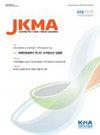转移性结直肠癌的手术治疗
IF 0.5
Q3 MEDICINE, GENERAL & INTERNAL
引用次数: 0
摘要
背景:IV期结直肠癌(CRC)在肿瘤范围和生物学上表现出异质性。随着多模式治疗和新的化疗药物的发展,转移性结直肠癌患者的总生存率有所提高。当前概念:对于肝、肺或腹膜转移性结直肠癌进行切除。转移手术切除少转移灶已发展与肿瘤消退使用化疗药物。两期肝切除术扩大了转移性结直肠癌患者的手术指征。有条件的患者可考虑肝及原发肿瘤同步切除。局部消融加放疗可用于治疗肺转移。同时,对于合并腹膜转移的结直肠癌患者,可考虑行减胞术联合腹腔内高温化疗。对于有症状的原发肿瘤伴有不能切除的转移的患者,应进行手术治疗。然而,在最近的研究中,对伴有同步、不可切除转移的无症状结直肠癌患者进行原发肿瘤切除并没有显示出总体生存获益。讨论与结论:转移性结直肠癌的治疗具有挑战性,因为其肿瘤范围多变且具有异质性。量身定制的手术治疗和多学科方法可以提高转移性结直肠癌患者的生存率和生活质量。本文章由计算机程序翻译,如有差异,请以英文原文为准。
Surgical treatment for metastatic colorectal cancer
Background: Stage IV colorectal cancer (CRC) exhibits heterogeneous characteristics in tumor extent and biology. The overall survival of patients with metastatic CRC has improved with the development of multimodal treatments and new chemotherapeutic drugs.Current Concepts: Resection of metastatic CRC is performed for liver, lung, or peritoneal metastases. Conversion surgeries to resect oligometastatic lesions have been developed with tumor regression using chemotherapeutic agents. Two-stage hepatectomy has extended the surgical indications for patients with metastatic CRC. Synchronous liver and primary tumor resection can be considered in patients with adequate conditions. Local ablation with radiotherapy can be used to treat lung metastasis. Meanwhile, for treating patients with CRC with peritoneal metastasis, cytoreductive surgery with hyperthermic intraperitoneal chemotherapy can be considered. Surgical treatments should be performed in patients with symptomatic primary tumors with unresectable metastasis. However, in recent studies, primary tumor resection in patients with asymptomatic CRC with synchronous, unresectable metastases did not show overall survival benefits.Discussion and Conclusion: The treatment of metastatic CRC is challenging because of the variable tumor extent and heterogenous characteristics. Tailored surgical treatments and multidisciplinary approaches may improve the survival and quality of life of patients with metastatic CRC.
求助全文
通过发布文献求助,成功后即可免费获取论文全文。
去求助
来源期刊

Journal of The Korean Medical Association
Medicine-General Medicine
CiteScore
0.50
自引率
0.00%
发文量
84
审稿时长
4-8 weeks
期刊介绍:
The Journal of the Korean Medical Association (JKMA) is the official peer-reviewed, open-access, monthly journal of the Korean Medical Association (KMA). It contains articles in Korean or English. Its abbreviated title is ''J Korean Med Assoc''. The aims of the Journal include contributing to the treatment of and preventing diseases of public health importance and to improvement of health and quality of life through sharing the state-of the-art scientific information on medicine by the members of KMA and other national and international societies.
 求助内容:
求助内容: 应助结果提醒方式:
应助结果提醒方式:


